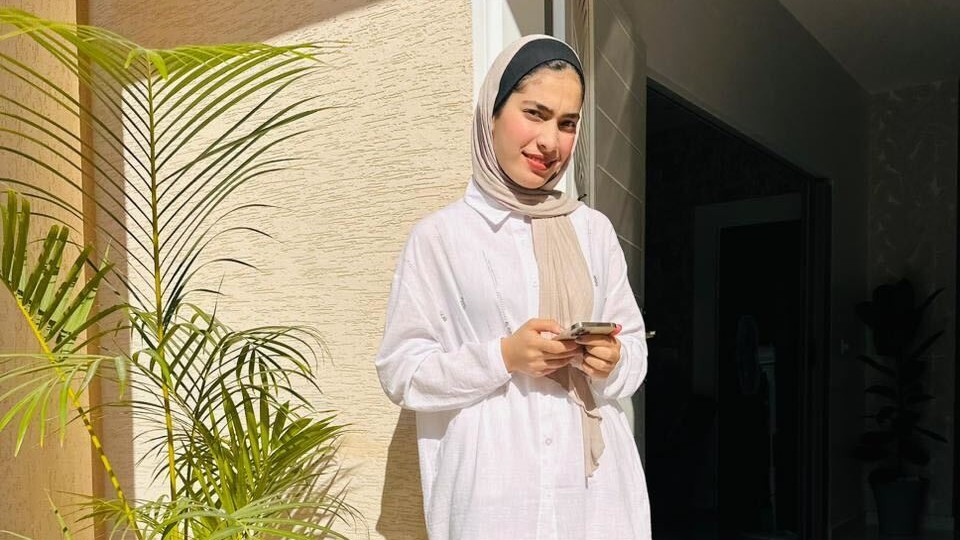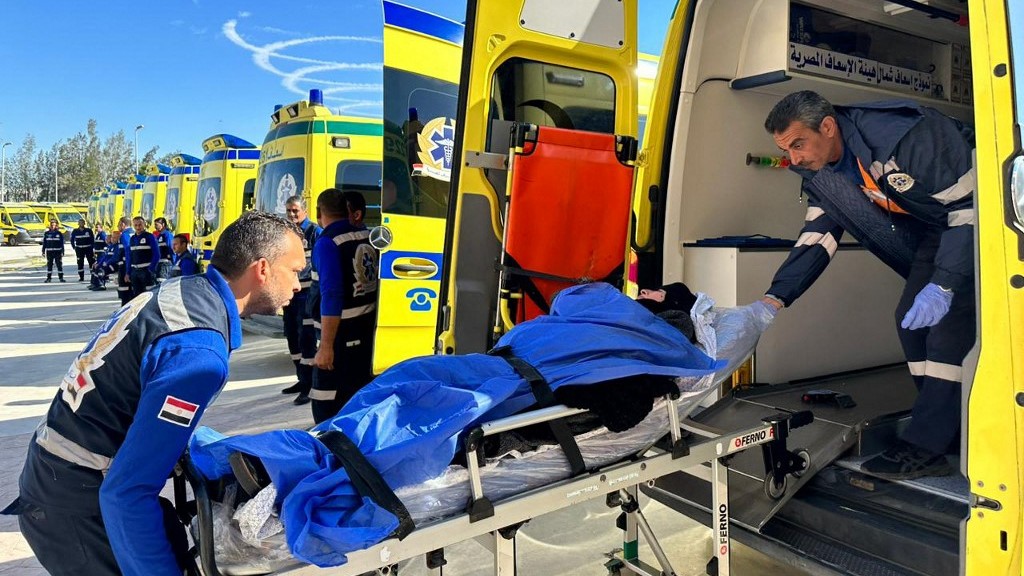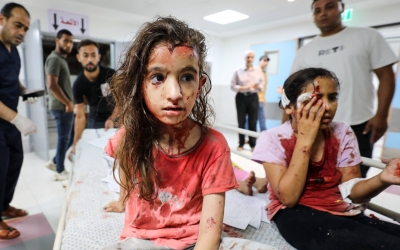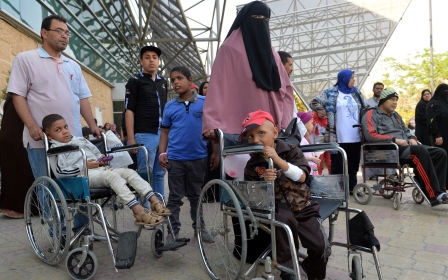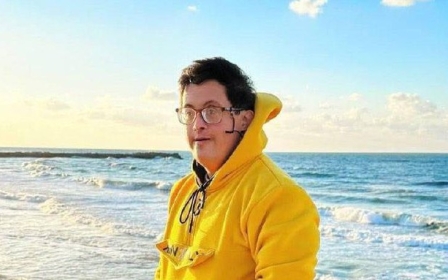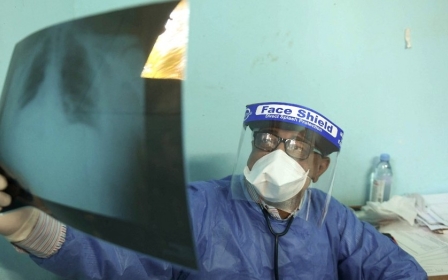Exclusive: Palestinian cancer patients stranded in Egypt struggle to find care
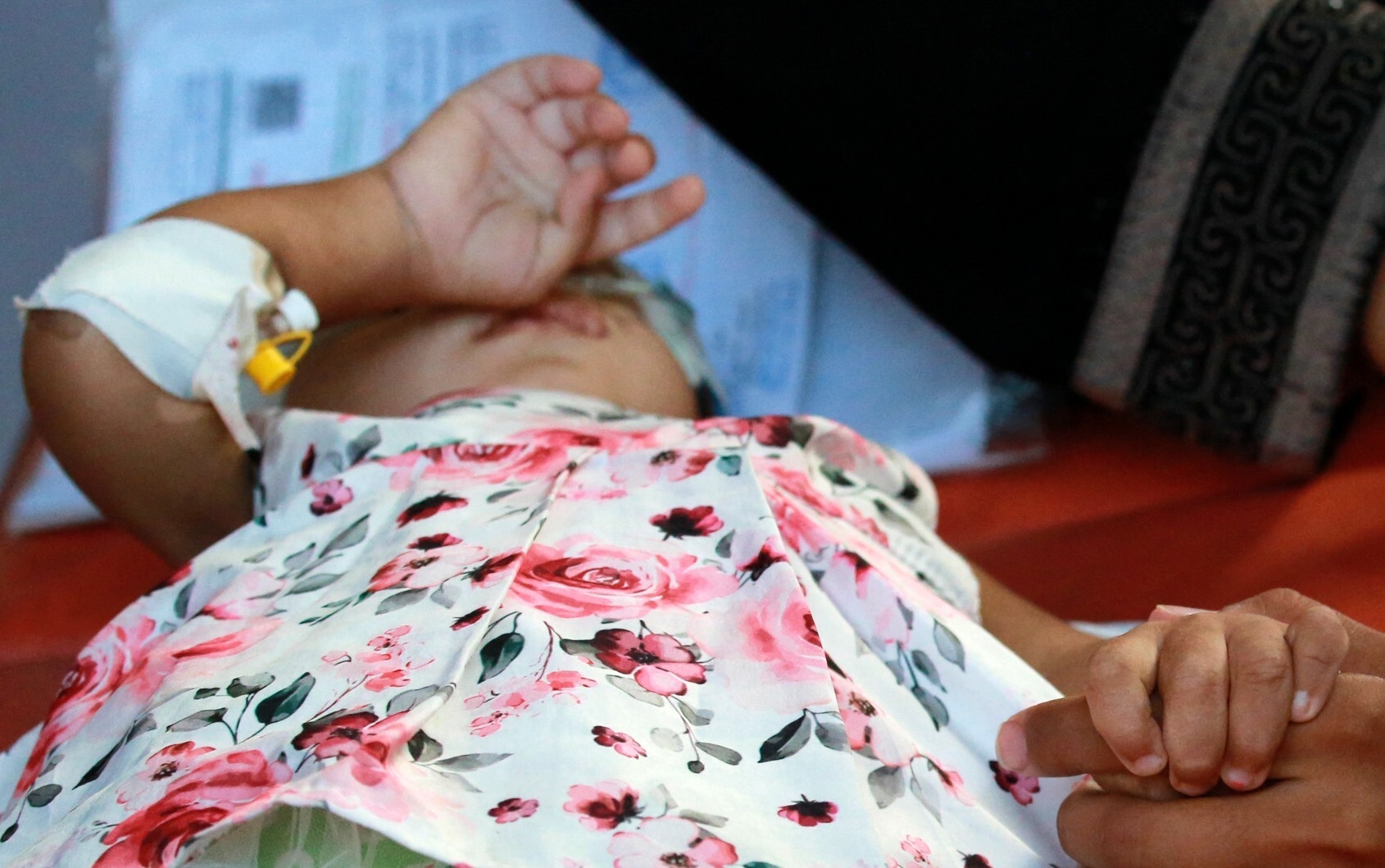
Hundreds of Palestinians with cancer, evacuated to Egypt during the Gaza war, are either going without medical treatment or receiving limited care in Egyptian hospitals, Middle East Eye can reveal.
According to a survey carried out by the Gaza-based cancer charity Towards Hope and Peace, at least 361 Palestinian cancer patients say they are not receiving the medical assistance they need after leaving the embattled Gaza Strip for Egypt.
Many of the patients and family members, including some of the dozen MEE interviewed, said they were told before leaving Gaza that they would be taken to third countries, including the United Arab Emirates and Turkey, for further treatment.
Egypt, which has taken around 6,000 Palestinian patients from Gaza into their hospitals since last October, was only intended to be a stop along the way.
But doctors and NGO staff say medical evacuations taking Palestinian patients out of Egypt have dwindled since this spring, leaving many stuck in facilities without cancer specialists, equipment or necessary medicine.
New MEE newsletter: Jerusalem Dispatch
Sign up to get the latest insights and analysis on Israel-Palestine, alongside Turkey Unpacked and other MEE newsletters
"We are left alone and dumped here," Linda Abu Mansi, a 24-year-old photographer who is now the caretaker of her 19-year-old sister, Hend, who has breast cancer, told MEE.
Four days before the Hamas-led attacks on Israel last October, her sister was scheduled for surgery to remove a 12cm tumour from her breast, Linda said.
That surgery never happened. After Israel began attacking Gaza, the family home in the Maghazi refugee camp in central Gaza was destroyed as was her sister's university where she studied medicine.
In March, the two sisters left their family behind. They were told Hend would be going to the UAE for treatment, Linda said.
Six months later, Hend has yet to receive any care since arriving at the Suez Hospital for Chest Disease. She has severe, constant uterine bleeding and is no longer able to speak because she is so weak.
"A delegation from the UAE came to the hospital once. A doctor was shocked and told her, 'I am sorry,'" Linda said.
Latifa Muhanna, a 49-year-old with breast cancer, understood that she was going to Turkey for treatment when she left Gaza without clothes or money in February.
When she first arrived in Egypt, Muhanna said she had chemotherapy and surgery to remove a tumour, but after the operation at Deyerb Negm Central Hospital north of Cairo, all care stopped.
Doctors relied on old scans she brought from Gaza instead of taking new ones after surgery.
"I haven't taken chemo for three months. I am scared it will spread again," Muhanna said.
The lucky ones
Despite their dire situation, doctors say that these patients could be considered the lucky ones.
Sobhi Skaik, a doctor and director-general of Gaza's only cancer centre, the Turkish-Palestinian Friendship Hospital, says at least 10,000 Palestinians with cancer still remain in the enclave, where Israeli attacks have destroyed the health system.
Skaik, whose hospital was bombed in October, is now in Egypt. He said among the 6,000 Palestinian patients from Gaza whom Egypt has taken in, at least 1,500 are suffering from serious illnesses, including cancer.
Egypt's healthcare system, particularly state-run facilities, struggled even before thousands of Palestinian patients were taken in for treatment.
"The Egyptians are trying to do their best for the patients of Gaza, but it's not ideal according to their abilities," he said.
"We are scattering our patients in different hospitals because of the capacity of the hospitals exactly. Their hospitals are overwhelmed with those patients."
But the main issue, Skaik and others involved say, is a disjointed approach which sees Israel decide which patients get security clearances to leave Gaza.
There is also little or no international coordination to match the patients leaving Gaza with the countries best positioned to provide care.
Belkis Wille, an associate director in the crisis, conflict and arms division at Human Rights Watch, has spent the past few months researching and writing about the medical evacuations of Palestinians from Gaza.
She told MEE that Palestinians came to Egypt because they received "the security green light, and not because Egypt has a bed and the treatment for you based on what you have."
"If Egypt is not able to treat their cancer, there are presumably many countries with the capacity to treat [it], so they should be travelling to the countries that can treat them instead of staying in Egypt," she said.
'There is no country taking them'
- Sobhi Skaik, director-general of the Turkish-Palestinian Friendship Hospital
Earlier in the war, medical missions saw hundreds of Palestinian patients leave Gaza for Egypt before onward journeys to the UAE, Turkey and Qatar for treatment. But those flights have now stopped. And while other countries including Italy, Belgium and most recently Malaysia, have taken some evacuees, these have usually been in relatively small numbers.
Many other states, including both Arab and western countries, have not stepped up to fill in the gap.
Priority has also often gone to those injured in the war rather than Palestinians with cancer or chronic illnesses who need longer-term care.
"Thanks really to Egypt who are accepting our patients to treat them," said Skaik. "We have no facilities to treat them in Gaza. Thanks to Italy. Thanks to Belgium. Thanks to many countries.
"But now there is no system at all. The patients are staying in Egypt. There is no country taking them," he said. "My message to the whole world is: what are they doing?"
'A real disaster'
Several months into the war, Isam Hammad, the treasurer of Towards Hope and Peace, said he and other directors of the charity were approached by Palestinian cancer patients now in Egypt who were struggling to get care.
Trying to gauge the extent of the problem, they asked over 600 Palestinian patients in Egypt whom they were in contact with to complete an extensive Google form if they felt they weren't receiving any or enough treatment for their cancer.
'You cannot just give the patient some medicine and some you don't give. It doesn't work like this'
- Isam Hammad, Towards Hope and Peace
In just three days, they had responses from 361 people in more than 50 different facilities.
"What I have seen with my colleagues is a real disaster," Hammad said.
"Cancer has a protocol. You cannot just give the patient some medicine and some you don't give. It doesn't work like this."
Many of the patients said they were in facilities without oncology units or without specialist doctors who are able to diagnose or prescribe the correct treatment.
Others said there are shortages of necessary medication or broken equipment.
MEE is not naming the patients, nor the facilities where they are staying to protect their privacy.
"In the beginning, treatment was available," a breast cancer patient in her forties noted in the survey.
"But since last month, Egypt has been suffering from a severe shortage of medicines, and my treatment is no longer available."
Six patients at five different facilities said they were told they needed CT scans, but were unable to have them because of a shortage of contrast dye.
One woman in her fifties with colon cancer had to wait three months to get a scan, her son reported.
"After the scan was done, it was found that there was a tumour in the liver due to the delay in treatment," he wrote.
Others said they had been tested or screened, but then waited weeks and months for the results.
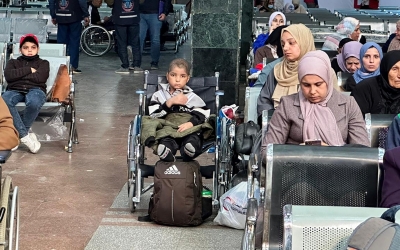
One teenager was scheduled to attend a specialist hospital in Ramallah on 8 October 2023 to be treated for low blood platelets and his enlarged liver and spleen that had already baffled doctors at three other hospitals.
But as with so many other cases documented in the charity's survey, his treatment was delayed by the attacks on Israel on 7 October and then the subsequent war.
In February, he arrived at a Cairo hospital with five other family members, who now all live in the facility. "We do not know the diagnosis yet and what the appropriate treatment is," they wrote earlier this month.
Others said they were discharged from hospitals, but required more treatment.
An elderly woman with breast cancer said she had been referred for radiation treatment.
"I was confined to the hospital without meeting the doctor even once," she wrote. "Then he decided that the condition was not necessary and [I] was discharged from the hospital."
Another patient with breast cancer said that in Gaza, she had received a monthly dose of Zoladex, a hormone therapy drug. In Egypt, she was given one dose during a three-month stay in a hospital.
"I did not ask to leave, but after giving one dose of Zoladex, the doctors decided to stabilise my condition and discharge me from the hospital," she wrote. When she returned to try to get another dose, she said she was turned away.
The woman said she is now trying to pay for her treatments privately, but struggles to afford the medicine along with rent and food for her and her niece, adding she lives in constant pain.
Hammad said many more patients who say they aren't receiving treatment have contacted him in the weeks since the deadline he set for them to fill out the form.
"Until today, I am still receiving people who want to submit their names," he said.
"All I want is the end of suffering of these helpless patients."
Evacuations stopped
Back in November, only weeks into the war, the UAE pledged to take in and care for 1,000 Palestinian cancer patients from Gaza.
That same month, Turkey's health minister at the time, Fahrettin Koca, said Turkey, too, would take 1,000 patients, "especially cancer patients who were being treated at the Turkey-Palestine Friendship hospital in Gaza".
While both countries have taken in hundreds of patients, aid workers and doctors tell MEE that neither country had evacuated the numbers they aspired to take before evacuations stopped out of Egypt several months ago. The UAE is now evacuating patients directly from Gaza.
Qatar, the third country that has taken the bulk of Palestinian patients along with the UAE and Turkey, also stopped evacuations from Egypt. But MEE understands that Qatar has primarily focused on patients with burns and orthopaedic issues, not cancer patients, in order to make the best use of its healthcare resources.
It is not clear why the evacuations from Egypt stopped. The Emirati and Qatari ministries of foreign affairs and the World Health Organisation did not respond to requests for comment. The Turkish and Egyptian health ministries declined to comment.
Wille said she asked the Egyptian authorities during a visit in April why Emirati evacuations had stopped and they said they didn't know.
"We asked them when there might be a new delegation coming from the UAE and other receiving countries to identify patients to take and they didn't know," she said.
'All we need is to take my sister abroad'
- Linda Abu Mansi, sister of cancer patient
Hanging in the balance is the fate of hundreds of cancer patients in Egypt, like Hend, who are now safe from bombs but whose futures are uncertain.
From a hospital room in Suez, where she has stayed continuously for six months, her sister Linda says their hopes are pinned on the UAE contacting them soon.
But she's not sure that will happen.
"Only those with contacts can get out," she said. "We don't have any contacts."
"All we need is to take my sister abroad. She is young and needs to continue her education and her life."
Middle East Eye delivers independent and unrivalled coverage and analysis of the Middle East, North Africa and beyond. To learn more about republishing this content and the associated fees, please fill out this form. More about MEE can be found here.


